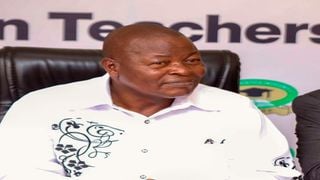
Kenya Union of Post Primary Education Teachers Secretary-General Akelo Misori (left) and chairperson Omboko Milemba address journalists in their offices in Nairobi.
| File | Nation Media GroupEducation
Premium
Teachers' union Kuppet now asks President Ruto to move JSS to secondary schools
A teachers' union has approached the Presidency and the Teachers Service Commission (TSC) to reverse the decision to place junior secondary school in primary schools, saying that learners are getting a raw deal.
Kenya Union of Post Primary Education Teachers (Kuppet) chairperson Omboko Milemba said yesterday that the government stands to save more than Sh100 billion by placing junior school in secondary schools.
Speaking at the union’s headquarters in Nairobi, he said that Kuppet has written to President William Ruto and Education Cabinet Secretary Ezekiel Machogu over the matter, and that officials had also met TSC chairperson Jamleck Muturi.
“The issue of junior school has never really settled and we believe [that] only fools don’t change their minds. We can change our minds and domicile JSS in secondary schools because we’re supposed to optimise existing resources,” said Mr Milemba.
He added that the current set up is wasteful of both human resources and the learners’ chance for better education, terming it a “cardinal mistake”.
According to Mr Milemba, for the government to effectively deliver quality education in JSS, 85,000 additional teachers would be needed. This would cost the government about Sh40 billion if they were employed on permanent and pensionable terms. This year, the government has recruited 56,000 teachers but junior schools remain heavily understaffed.
“With the second JSS class joining in 2024, the teachers will be even more stretched. Unless the government can hire 85,000 teachers by January, the current staffing in JSS would be too insufficient to offer meaningful education in the institutions,” Mr Milemba said.
The majority of teachers hired this year are on contract terms and earn Sh20,000, less than half of what those who start on permanent terms earn. The union called for conversion of their status to permanent. Hiring the projected 85,000 teachers as demanded by Kuppet would cost the government more than Sh40 billion per year.
The union argues that secondary schools would not require such a huge number of teachers if JSS is moved there. Additionally, Mr Milemba said that secondary schools already have the needed infrastructure that none of the public primary schools have.
“The primary schools where JSS is domiciled lack the critical infrastructure, including laboratories, libraries and facilities for extracurricular activities. The learners are losing out on vital practical knowledge across the spectrum and most disastrously in the sciences for which primary schools are grossly deficient of infrastructure.
“Whereas the Guidelines for Implementation of Junior Secondary Education provided a path for the development of such facilities, that endeavour is too costly and will take time, depriving current learners of the quality education they deserve,” Mr Milemba said.
In order to put up one science laboratory in each of the 23,000 public primary schools, the union estimated that the government would need about Sh70 billion.
From 2025, when JSS will comprise three classes (Grades 7,8 and 9), primary schools will require an extra classroom. Kuppet put the total cost at Sh23 billion to cover all the schools.
“At a time when the government is grappling with numerous financial struggles, including university funding, employment of teachers and the establishment of infrastructure, it beats logic that the country is now planning to build facilities like laboratories in primary schools, when these already exist in secondary schools,” Mr Milemba said.
The National Assembly has moved Sh4.3 billion from the Ministry of Education budget to the National Government Constituency Development Fund to be used for development of infrastructure in schools.
The decision to place JSS in primary schools was made following recommendations by the Presidential Working Party on Education Reforms. In its report, the team said that after stakeholder engagements, the majority of respondents favoured having the learners within the primary school compound.





